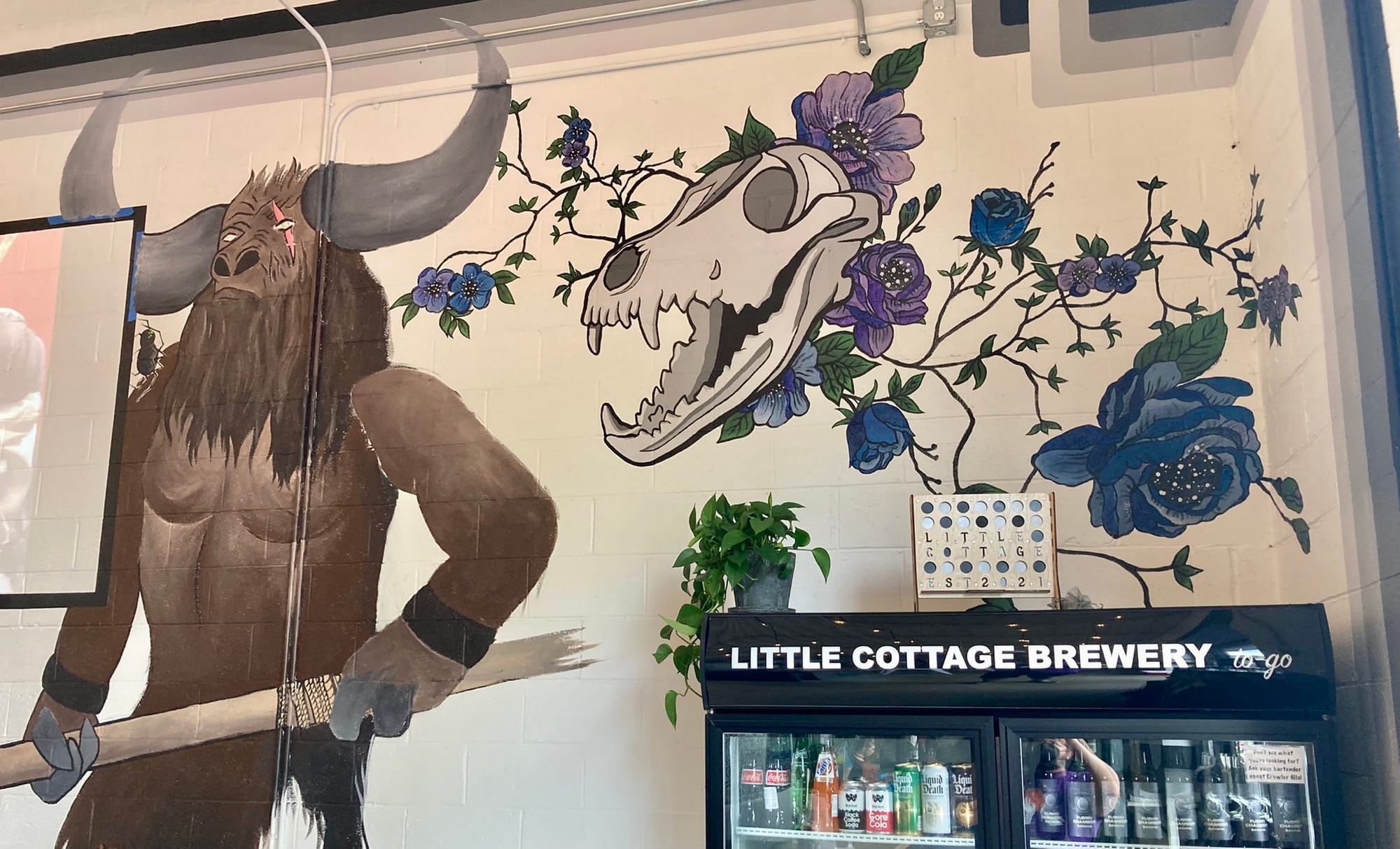
[above: Jason Pellett in the early days of Orpheus Brewing, 2014]
When I opened Orpheus Brewing in Atlanta in 2014, we couldn’t sell any beer to drink on-site, any beer to-go, or any beer directly to bars or stores. We couldn’t serve food—not even so much as a bag of chips—and we couldn’t serve any alcohol except the beer we made ourselves. We were, however, allowed to give our beer away by selling “tours” of the brewery that came with free beer. The only other way to get our beer to the people was to sell it to a distributor. It was truly absurd in every way.
Laws did eventually improve in 2017, but Georgia breweries are still not able to sell more than 288 ounces (or one case—translation: no kegs) of beer to-go, per person, per day. They still aren’t allowed to sell any directly to bars, stores, or restaurants. They can’t ship beer to anyone, even though the state decided a few years back to let restaurants and stores do so. And they can’t sell any alcohol made elsewhere. You can thank Georgia booze distributors and the deep pockets that they’ve been emptying onto Peach State lobbyists for decades for what results in one of the most unfair alcohol markets in the entire country.
It’s completely ridiculous, and I’ve had enough. After nine years of fighting a losing battle, we made the difficult decision to license the brand and close Orpheus’ Atlanta headquarters. While my involvement in the business at this point is minimal, Orpheus beers are currently brewed in facilities in other states and distributed to various retail outlets.
Longing for a market that’s the polar opposite of the Peach State’s, I recently moved to Amsterdam to start anew. Thanks to the Netherlands’ business-friendly laws, my next brewery will be the kind of owner-operated venture that people imagine when they talk about “small business.” Being able to self-distribute our beer will allow us to operate at a small enough scale that my wife and I will be able to run the brewery ourselves out of our house.
The state of Georgia and the city of Atlanta—despite all their propagandistic talk of being “friendly” to businesses—are prime examples of artificially restricted markets that only benefit the wealthy benefactors of political leaders at the expense of people and less-favored businesses.
In the case of the beer industry—nationwide, but especially in Georgia—those benefactors are the distributors. Alcohol sales in the United States are divided into three tiers: producers (breweries, wineries, distilleries), retailers (stores, restaurants, etc.), and distributors (the people who take the booze from point A to point B). Georgia politicians—influenced by massive lobbying and donations—decided many years ago to consolidate an immense amount of power in that distributor tier.
So much power, in fact, that breweries are, in large part, beholden to the whims of their distributors. Speak out against this crooked system? You might get punished by the company that’s responsible for all of the sales outside of your brewery. Want to switch distributors? You can’t, unless they decide to let you out of your contract.
It’s a broken system. A truly unfortunate part of making beer in Georgia. And, again, it’s been this way for a long time! The fact that we have as many great local beers as we do these days is truly a wonder, considering the circumstances.
It’s a rough time for small breweries in the Atlanta area with at least nine of them closing their doors in the last year and many others on the brink. This is part of a national trend, but breweries here start from a more precarious position and have fewer options available to adjust.
Obviously, brewers want to see legislative changes, but with the softening of the market and a waning of interest in beer—both locally and nationally—it’s fair to ask why anyone else should care. All of this was on my mind as I started writing this essay. But I also realized that the singular thing that’s always guided me on my beer journey is my desire to make stuff that gives people joy. Georgia’s current laws make that mission needlessly difficult. It feels important and necessary to explain why I left.

As Georgia beer laws have slowly started to loosen over the years, so too has the idea of “Georgia brewery” evolved. We’ve now got a handful of amazing smaller beer makers who either don’t distribute or only distribute a very small amount. Think Halfway Crooks in Summerhill, or Inner Voice in Decatur.
Little Cottage is one of those new breweries. Jon Shari created an incredible and justifiably hyped homebrew brand long before opening a small commercial brewery in Avondale Estates in 2021. It was built to take full advantage of the 2017 law changes that granted a limited volume of onsite sales. Moreover, Shari chooses to send very little beer into distribution.
When I asked him why he bothered to distribute at all, Shari told me he only supplies a few, strictly-local places—mainly Brick Store Pub in Decatur and My Parent’s Basement in Avondale. But he clarifies that “it’s more for the marketing than the volume—we don’t have a lot of volume as it is. We’re still a new place that’s being recognized by people coming in for the first time. ‘Oh, I didn’t know you guys were here. How long have you been around?’ I realized we need to try to push a little bit more out.”
While Little Cottage is making the most of a bad situation, there’s no reason that small beer makers in Georgia should have to compromise. We have the literal worst beer laws in the nation, and their restrictive nature doesn’t serve anyone. Except, of course, the distributors.
When a beer maker isn’t required to satisfy the two other levels—distributor and retailer—of the three tiers, they can better show off their creative depth in smaller batches of beers in-house. Plus, imagine this happening in any other industry. A baker who can’t sell you a loaf of bread, who instead has to point you to a store up the street or across town? Preposterous.
Since we were built for 2014’s laws, Orpheus had a much larger brewing system than could be utilized to brew beer exclusively for the taproom. What this means is that the beer we had on tap was generally the same beer that we made large volumes of for distribution. I was constantly aware of the desire for new IPAs and lagers in our taproom, but didn’t have a system to make those beers. I would have loved to also be able to serve beer from other breweries in my taproom, which would have supported those fellow small businesses, given our customers more choices, and helped us. Alas.
While little has changed for beer in the Georgia legislature since 2017, there’s hope on the horizon. Senate Bill 163—which died in committee in 2023, but is back for the 2024 session—would allow up to 3,000 barrels of self-distribution within 100 miles of a brewery, beer sales to other brewery taprooms, discontinuation of a distributor relationship with 30-day notice (plus payment for fair market value of distribution rights), and the removal of the daily limit for off-site sales.
If all of this stuff sounds reasonable to you, you should sign the Georgia Craft Brewers Guild’s petition to let lawmakers know that you support modernizing Georgia’s beer laws.
If the bill passes without a bunch of meddling amendments, it’ll be the biggest thing that’s happened in the history of Georgia beer, a huge win for small businesses, and a notable shot across the bow of the nefarious, mafioso-esque middle tier. If it doesn’t pass, well, ain’t that just how it goes in the Peach State?
Either way, by the time the bill’s fate is decided, I’ll be enjoying the wildly better beer laws of the Netherlands, preparing to launch a new era of my career. Here’s hoping my friends back in Georgia will one day get to enjoy those same freedoms.

Jason Pellett
Jason Pellett spent 38 years in Atlanta, first as a trumpet player, then as a brewer who started Orpheus Brewing in his kitchen. He and his wife will soon open their new brewery, The Hollows, in Amsterdam. He’s currently learning Dutch and playing trumpet again for the first time in a decade.
